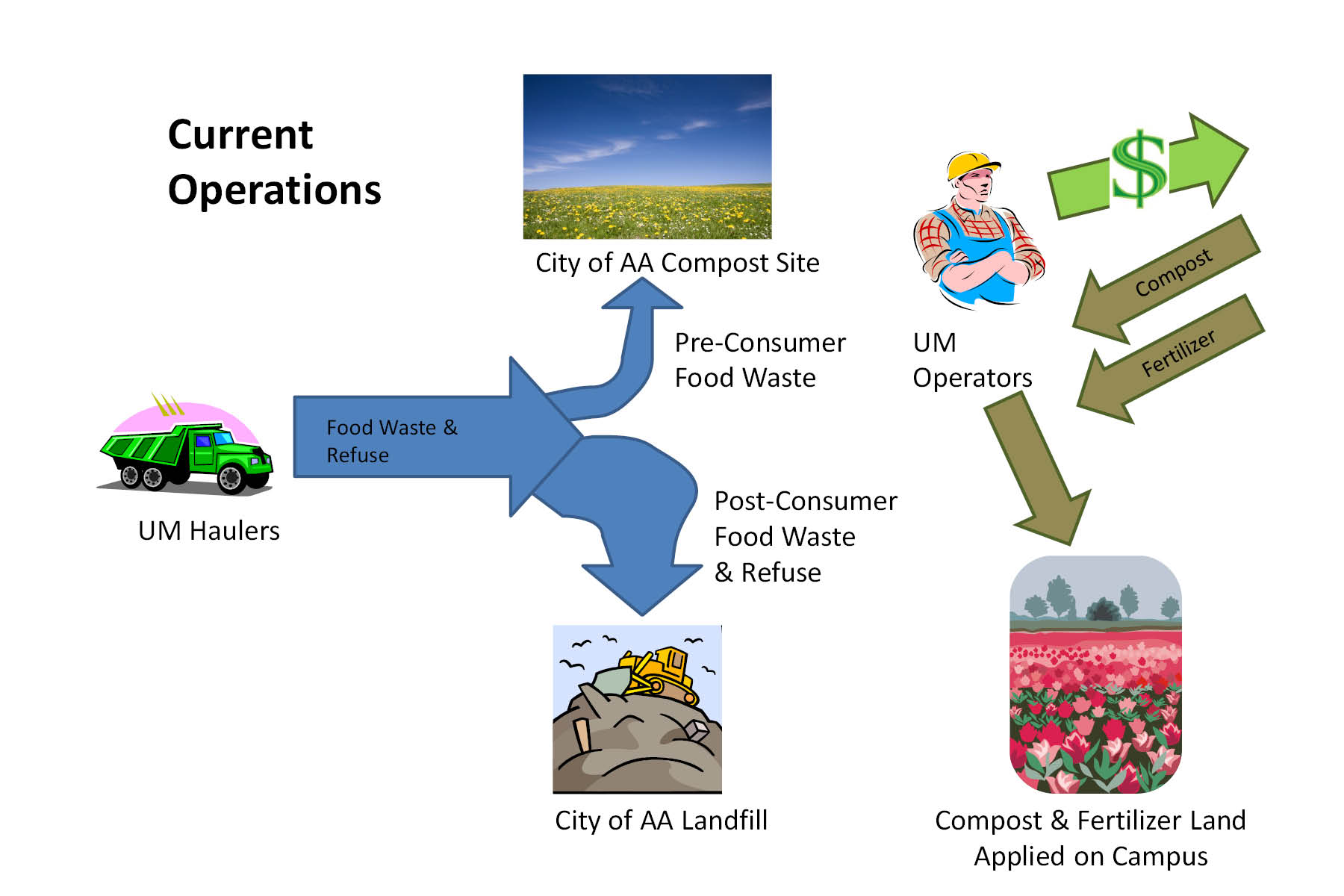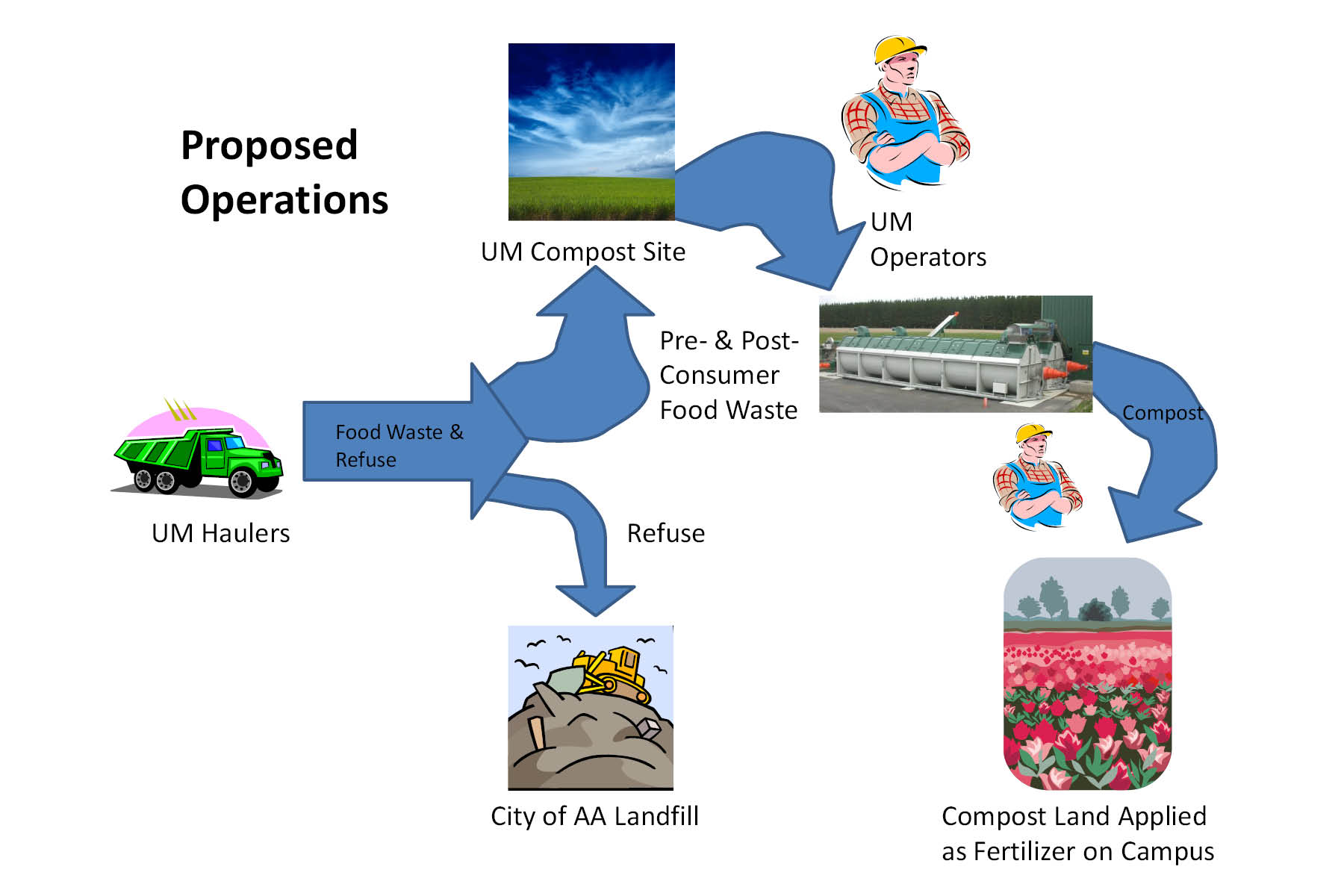THE CLIENT
The University of Michigan (UM) is a public research university with over 43,000 students located in Ann Arbor, Michigan. The University was founded in 1817 with a campus covering more than 780 acres with 580 buildings. UM offers 250 degree programs, including undergraduate degrees; doctoral degrees in the humanities, social sciences; and professional degrees in medicine, law, nursing, social work and dentistry.
THE CHALLENGE
UM had an existing composting program that included yard waste and pre-consumer food waste, such as fruit and vegetable trimmings, egg shells, and stale bakery items. The yard waste portion of the program collected brush and leaves from around campus, and the food waste portion of the program collected pre-consumer food waste from kitchens in six residence halls and three student unions/gathering areas.
The Ross School of Business, the Student Sustainability Initiative, the University’s Integrated Assessment and students across campus showed an interest in expanding the composting program. UM was interested in expanding the program to include all compostable materials and to cover all buildings on campus. However, expanding the program would mean finding a new composter to take the materials, because the University’s existing composter, the City of Ann Arbor, only had a limited capacity for materials. UM hired RRS to conduct a study of the campus’s options for expanding the composting program, including providing recommendations on the most appropriate processing technology and the most appropriate sites based on each technology.
THE SOLUTION
RRS worked closely with UM to gather sufficient data to accurately estimate the amount of compostables generated on campus and to determine composting costs to the University. A waste characterization was conducted on six different buildings, sorting building refuse into 12 categories to determine a general breakdown of the waste at each type of campus building. The study considered the impacts of potential changes in truck routing, waste and compostable material collection frequency, compostable products and available space.
The RRS team developed a phased approach to implement the campus-wide program and created detailed estimates of waste amounts by building to estimate available organics, costs, and ability to add new sources of materials. In Phase I, the exisiting composting program would expand to collect postconsumer food waste. Phase II would expand to take-out cafes and “grab and go” stores on campus, switching them over to compostable containers. Phase III would include buildings like the additional residence halls, student unions, and the remaining campus research buildings. Phase IV would complete the expansion by including classrooms, recreational buildings and administrative buildings.
 RRS also analyzed a variety of processing options for UM, including anaerobic digestion, composting, and two off-site composting operations. RRS looked at several sites on campus, examined their potential as composting sites, and gathered information from 10 vendors on their ability and fees to provide either composting or anaerobic digestion to the University.
RRS also analyzed a variety of processing options for UM, including anaerobic digestion, composting, and two off-site composting operations. RRS looked at several sites on campus, examined their potential as composting sites, and gathered information from 10 vendors on their ability and fees to provide either composting or anaerobic digestion to the University.
RRS recommended that before purchasing an in-vessel composter, at an investment of $1 million and ongoing operating costs of $40
per ton, UM run a pilot project to test the system using both preand post-consumer food waste from the dining hall.
RRS provided an analysis of various processing technologies and four potential on-site composting locations, as well as criteria required for an in-vessel compost operation site. RRS recommended that UM pursue near-term options with the current compost operator to see if they would accept a wider range of materials, as well as to explore regional opportunities with other universities, hospitals and businesses that were also interested in expanded food waste composting.
THE RESULTS
Since the feasibility study was completed, UM has expanded its composting program to include post-consumer food waste at 10 buildings. Since FY 2010, UM has seen an increase in volume of composted food waste from 126,097 lbs. to 337,298 lbs. in FY 2014. UM continues to look for additional improvements to the program: RRS was hired to conduct a waste sort for administrative buildings and the University is considering onsite processing options, such as an-aerobic digesters.
